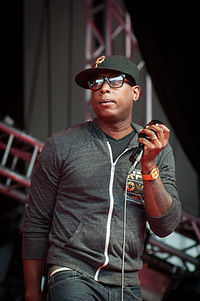Difference between revisions of "Atheism and hip hop music"
Wikignome72 (Talk | contribs) (→Greydon Square) |
Wikignome72 (Talk | contribs) (→Greydon Square) |
||
| Line 27: | Line 27: | ||
== Greydon Square == | == Greydon Square == | ||
| − | |||
| − | |||
[[File:Greydon Square GAGOP.jpg|200px|right|thumbnail|Greydon Square]] | [[File:Greydon Square GAGOP.jpg|200px|right|thumbnail|Greydon Square]] | ||
| + | ''See also:'' [[Black atheism]] | ||
Eddie Collins (born September 28, 1981), who is better known by his stage name [[Greydon Square]], is an American West Coast [[hip hop]] emcee, producer and sound engineer from Compton, California. See also: [[Atheism and hip hop music]] | Eddie Collins (born September 28, 1981), who is better known by his stage name [[Greydon Square]], is an American West Coast [[hip hop]] emcee, producer and sound engineer from Compton, California. See also: [[Atheism and hip hop music]] | ||
Revision as of 05:40, October 14, 2019

According to the American Humanist Association:
| “ | It may seem a bit odd, then, that so many major hip-hop artists ...are not only deeply religious but produce music that includes overt tributes to their own faith.
Consider Kanye West, whose new album Yeezus has been the year’s most anticipated release. Aside from the blatantly religious (and ostentatious) title, the record is littered with references to a Christian god. This should be unsurprising for a man who won a Grammy for the song “Jesus Walks” in 2004, but to consider the size and scope of not only West’s audience but also his critical devotion, it’s staggering that in a country of ever-deepening religious skepticism an album as blatantly Christian as Yeezus would be an almost guaranteed best-seller. But what’s most troubling for the non-believing listeners isn’t the album’s religious content. What’s most troubling is that the religious content is so common in hip-hop that it’s not even mentioned. So many popular rap artists are vocally religious that it’s become not just acceptable, it’s become the norm... Today, it’s rarer to find a rapper who doesn’t make hay of their faith than to find one who does. This isn’t to say that religion is the only element that’s frustrating for humanist rap fans. There are prominent atheist rap artists whose content is just as uncomfortable, most notably the controversial LA collective Odd Future, a group of young men who promote atheism but use Satanic imagery on their album covers and rap about rape, murder, and drugs to the point that it’s cartoonish. Humanists need a place in the hip-hop community.[2] |
” |
Contents
Atheist Hip Hip artist Dessa
The American Humanist Association declares about the atheist Hip Hop artist Dessa:
| “ | Raised Catholic, Dessa went through a gradual transition to atheism when she was in her early teens. As an adult, she’s found an eagerness for promoting non-believers and their issues whenever she can. The first step, in her view, is getting skeptics to stop hiding.
“I think it’s important for atheists to come out and say that we’re atheists... For now, the best thing for humanists and other non-believers to do is be honest. “There’s no need to print up t-shirts or anything. I’m not recruiting, per se,” Dessa says. “But I think answering the question honestly when it comes up is enough.”... “I think as I’ve grown older, I’ve just grown more comfortable in my own skin,” she says. “I know it’s a surprise to people when I say I’m an atheist, I know it’s a disappointment to some people, but I think I’m just more comfortable owning it. And it’s a part of my life and my outlook that I’m excited about. I like being an atheist. I think it’s kind of awesome.”[3] |
” |
Greydon Square
See also: Black atheism
Eddie Collins (born September 28, 1981), who is better known by his stage name Greydon Square, is an American West Coast hip hop emcee, producer and sound engineer from Compton, California. See also: Atheism and hip hop music
The article 50 Top Atheists in the World Today indicates about the black atheist Greydon Square:
| “ | Greydon Square is an Iraq-War veteran and rap artist, who incorporates atheism into his musical act. Born Eddie Collins in the low-income Los Angeles suburb of Compton, Square became immersed in gang culture, but changed his life by enlisting in the United States Army in May of 2001. The punning title of his 2007 album, “The Compton Effect,” reflects his background as an erstwhile physics major—to which he attributes his conversion to atheism. In his rap songs, he boasts about desecrating Brigham Young’s grave and urinating in a synagogue. The Phoenix New Times has called Square “the black Carl Sagan.”[4] | ” |
Ex-atheist, Hip Hop artist Talib Kweli
See also: Atheism and its retention rate in individuals
The Hip Hop artist Talib Kwelli was an atheist during a portion of this teen years, but he became an ex-atheist before he reached 20 years old.[5]
Atheism, ethnic minorities and hip hop music
See also: Western atheism and race and Black atheism and Atheism and diversity
Hip hop music originated during the early 1970s by African-American and Puerto Rican youths living in the South Bronx in New York City. In the United States, African-Americans and Latinos play a major role in Hip Hop music.
In 2015, BloombergView reported concerning the United States:
| “ | According to a much-discussed 2012 report from the Pew Research Center on Religion and Public Life, only 3 percent of U.S. atheists and agnostics are black, 6 percent are Hispanic, and 4 percent are Asian. Some 82 percent are white. (The relevant figures for the population at large at the time of the survey were 66 percent white, 11 percent black, 15 percent Hispanic, 5 percent Asian.)
...Craig Keener, in his huge review of claims of miracles in a wide variety of cultures, concludes that routine rejection of the possibility of the supernatural represents an impulse that is deeply Eurocentric.[6] |
” |
See also
Notes
- ↑ That One Time When I Was Atheist, and The Influence of Malcolm X
- ↑ The Religiosity of Kanye West’s New Album, Yeezus (Part One of “Humanism and Hip Hop”)
- ↑ Humanism and Hip-Hop (Part 2): Rapper Dessa Talks Atheism, Social Justice
- ↑ 50 Top Atheists in the World Today
- ↑ That One Time When I Was Atheist, and The Influence of Malcolm X
- ↑ The Atheism Gap By Stephen L. Carter, BloombergView, Mar 27, 2015 4:26 PM EDT

